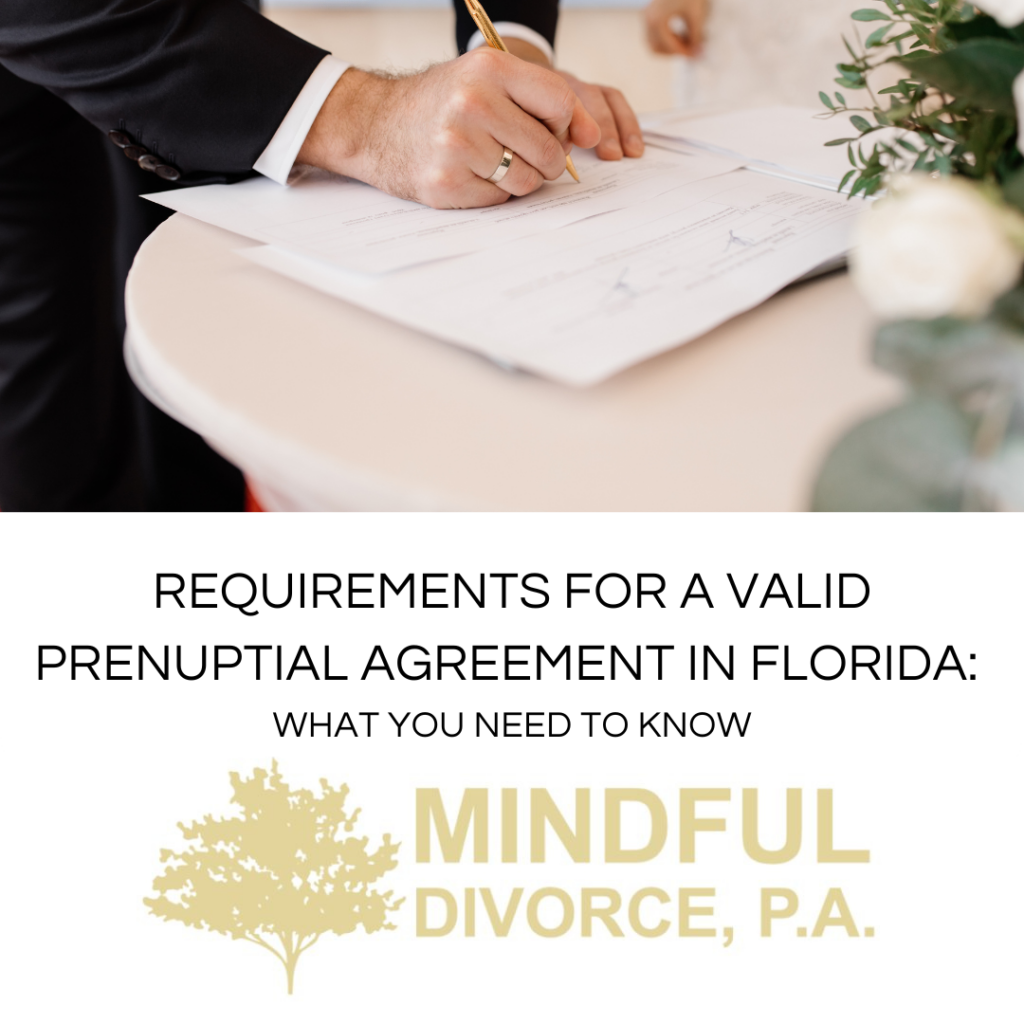Talking about a prenuptial agreement might feel a bit awkward when planning a marriage, but for many couples, it’s a completely sensible step.

This simple document can help prevent conflicts down the road and protect each party’s assets, ensuring peace of mind for both.
But to serve its purpose, a prenuptial agreement must meet certain legal requirements in Florida—otherwise, it could be dismissed by a court when it matters most.
At Mindful Divorce, P.A., we’ve worked with countless couples on prenuptial agreements, helping them clearly understand the requirements for a valid prenup under Florida law.
Our commitment to clear, fixed-fee schedules means you won’t face surprises, allowing you to focus on what matters most.
What is a Prenuptial Agreement?
A prenuptial agreement, or prenup, is a legal contract created between two people before they get married. It outlines the ownership of assets and responsibilities of each spouse in the marriage.
Think of it as a guide for dividing finances, property, and other responsibilities, should the marriage end.
This type of agreement can also be used to define responsibilities during the marriage, keeping both parties on the same page financially.
It’s important to note that a prenup differs from a postnuptial agreement, which is signed after marriage and can sometimes have different legal standards.
Why You Might Want a Prenuptial Agreement
Couples opt for prenuptial agreements for various reasons. Here are some common scenarios where a prenup might make sense:
- Protecting Assets: If one or both parties have substantial assets they wish to keep separate—like inheritance, personal property, or business interests—a prenup can help safeguard these.
- Clarifying Financial Responsibilities: Setting expectations on finances can be helpful in marriage. Some couples use a prenup to outline contributions to savings, debt payments, and even daily expenses.
- Addressing Premarital Debts: If one spouse has significant student loans or credit card debt, a prenup can clarify that the debt remains theirs alone, keeping the other spouse’s finances separate.
- Providing for Children from Previous Relationships: A prenuptial agreement can be used to protect certain assets for children from previous relationships, ensuring that they’re financially provided for.
- Avoiding Future Conflicts: Divorce can be a stressful and emotional time. Having a prenup in place can reduce potential disputes and simplify the process.
Requirements for a Valid Florida Prenuptial Agreement
Creating a prenuptial agreement that will hold up in court requires careful attention to Florida’s legal requirements. Here’s what needs to be in place:
Written Agreement
Florida requires prenuptial agreements to be in writing and signed by both parties. A verbal agreement simply won’t cut it; if it’s not written down and signed, it won’t be enforceable in court.
Voluntary Execution
A prenup must be entered into voluntarily, without any coercion or undue pressure. If one spouse can prove that they were pressured or forced into signing, the court may consider the agreement invalid.
Factors like the timing of the agreement (such as signing the night before the wedding) can come into play here, as it might indicate a lack of true consent.
Full Financial Disclosure
Each spouse should provide a complete and honest disclosure of their assets and debts. If one party fails to fully disclose their financial situation, the agreement might not be enforceable.
Complete transparency is key to ensuring fairness and avoiding future disputes.
Fair and Reasonable Terms
Florida courts may examine the fairness of a prenuptial agreement at the time it’s enforced. If the agreement seems grossly unfair under the current circumstances, a judge might set aside parts of it.
Courts look at several factors, including each spouse’s needs and financial standing, to determine if the terms are reasonable.
Independent Legal Counsel
Though not legally required, it’s strongly recommended that each spouse has their own attorney review the agreement. Independent counsel ensures both parties fully understand the terms, reducing the risk of disputes later.
Notarization
While notarization isn’t required in Florida, it adds an extra layer of credibility to the agreement. A notarized prenup can strengthen its validity, making it harder to challenge in court.
Effective Upon Marriage
The agreement only becomes effective upon the marriage. So, if the wedding doesn’t happen, the prenuptial agreement holds no power.
What a Prenuptial Agreement Cannot Cover
Even with a valid prenup, there are some things that the agreement simply can’t control.
Limitations
Certain topics are off-limits in a prenup, such as:
- Child Custody or Support: Florida courts decide matters like child custody or support based on the child’s best interest, and they’re not subject to negotiation in a prenup.
- Provisions That Violate Public Policy: Any terms that might encourage divorce or involve illegal activities are not enforceable.
Alimony Considerations
While it’s possible to waive alimony rights in a prenup, Florida courts can override this waiver if one spouse becomes financially dependent on the state.
Courts assess each spouse’s financial situation and may choose to enforce alimony provisions if it’s deemed necessary.
Challenging the Validity of a Prenuptial Agreement
There are several reasons a spouse might challenge the enforceability of a prenuptial agreement. Common reasons include:
- Duress or Coercion: If one spouse was pressured into signing the agreement, it might be invalidated.
- Lack of Financial Disclosure: Concealing assets or debts can render the agreement unenforceable.
- Unfair Terms: If the agreement was one-sided or unreasonable at the time of enforcement, a court may choose not to uphold it.
The Cost and Timing of a Prenuptial Agreement
Prenuptial agreements can vary in cost, depending on factors such as the complexity of the agreement, attorney fees, and the need for revisions.
Cost Factors
Simple agreements with fewer assets might cost less, while more detailed contracts could require higher legal fees. Generally, expect prenup costs to range from a few hundred to a few thousand dollars.
Timing
To avoid any issues with coercion or lack of time for review, it’s important to start the prenup process well before the wedding.
This allows each party ample time to consult with their own legal counsel and ensures the agreement is thoroughly reviewed and understood.
Need a Prenuptial Agreement in Florida? Contact Mindful Divorce, P.A. Today
When it comes to protecting your future and making sure everything is fair and clear, a prenuptial agreement can be a valuable tool.
At Mindful Divorce, P.A., we understand the importance of getting it right. Our fixed-fee structure means you’ll know exactly what to expect, without the surprise of hidden costs.
If you’re considering a prenup, don’t hesitate to reach out for a consultation at 561-537-8227.
Let’s work together to ensure you and your partner have the clarity and security you need as you start this new chapter together.






